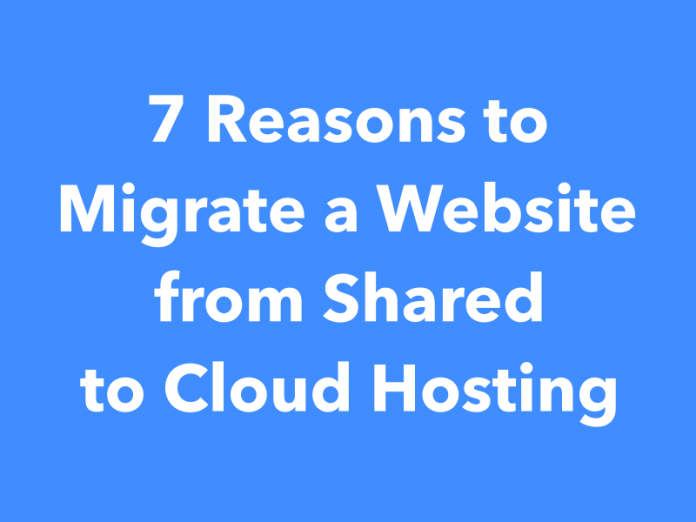The customer experience (CX) has become a driving factor in today’s online market and an arena in which companies are striving to compete. As a result, businesses wishing to remain competitive are being compelled to transform their websites, adding new tools and functionality in order to deliver better experiences to their customers. Robert King, Director of eukhost, explains why, to meet the expectations of a modern website, companies should migrate their website from shared hosting to cloud hosting.
The limitations of shared hosting
As technology evolves, so do consumers’ expectations about the experiences they have when they visit a brand’s website. Today, those expectations include personalisation, multi-channel communications and seamless omnichannel shopping experiences across websites, mobile apps and physical stores. They also expect websites to provide a wider range of CX enhancing tools.
It is why banks deploy robo-advisors, furniture and clothing stores use augmented reality, and garage sites have tools that help customers find their tyre sizes. We also see stores from across all sectors make use of AI-enabled chatbots, so customers can get instant answers to their questions 24/7.
While these features are great for attracting and retaining customers, an issue faced by many website owners is that their shared hosting plans just aren’t up to the tasks of meeting these new demands. Adding these advanced new features to a website requires far more storage, RAM, CPU and bandwidth than shared hosting accounts can comfortably cope with. Indeed, some features even require websites to be integrated with other applications.
Offering personalisation akin to Amazon and other leading eCommerce stores, for example, needs to make use of customer data. This can require integration with both the CRM and AI-enabled product recommendation engines. Running all these apps and storing the ever-growing mountain of data required isn’t workable on a shared server.
The benefits of cloud hosting
There are several alternatives when upgrading from shared hosting, such as VPS and dedicated servers; however, for businesses looking to serve more customers and continually add new features, the cloud is likely to be the final destination for a website. Instead of facing continual challenge and disruption by migrating from shared to VPS to dedicated server to cloud as the site grows, it makes both financial and business sense to migrate to the cloud from the outset. Here are the top reasons to do so.
- Cloud hosting is affordable and saves money
Shared hosting is an entry-level solution and its limited resources and lack of advanced features mean upgrading to any other type of hosting is going to be more expensive. It is important, however, that any new solution is affordable and offers value for money. The advantage of cloud hosting is that you can start small and grow your package organically in line with your business needs.
- Pay-as-you-go scalability
One of the biggest attractions of the cloud is its scalability. If a website is seeing an unexpected surge in visitors and needs more capacity to deal with demand, users can scale up at the click of a button. What’s great from a financial perspective is that scaling down is just as easy and any additional resources used are paid for on a pay-per-use basis. This ensures companies can always keep their websites performing optimally while retaining control of their budgets.
This scalability isn’t possible with shared hosting and, as a result, websites may become sluggish or even crash if demand is too high for its limited resources. This is even more likely if those visitors are making use of the advanced features mentioned above.
- Work quicker
Speed to market is important to beat off competition and the cloud makes it far quicker to take advantage of the latest tools. Technologies that today’s websites are increasingly making use of, like AI, can be deployed almost instantly in the cloud and most of the apps are open-source and free to use. This accelerates the pace of your website’s development when implementing advanced features, like product recommendation engines, which are so important to CX.
- High availability
Critical applications, like websites, need to be available without interruption. Any break in service can affect customer confidence and result in loss of income. The very nature of shared hosting means that high availability is not possible. As a dedicated server shared by many users, the web host will, from time to time, need to take it offline to conduct essential maintenance, for example, to update the operating system, install a security patch or fix a hardware issue.This is why most shared hosting plans offer only 99.9% uptime.
Cloud hosting, by comparison, is able to provide high availability uptime levels of 100%. This is a result of websites being hosted on virtual machines which, if a hardware issue occurs, can be moved instantly to another machine in the cloud cluster. The hyper-converged design of the cloud protects against hard drive and even entire server failure. And with replicated servers stored remotely, availability continues even if a natural disaster takes the data centre offline.
- Superfast performance
Slow website loading and response times can result in site abandonment and lower-ranking search engine results. Cloud servers are built and configured to perform far faster than shared servers, making use of the latest Intel Xeon CPUs and SSD drives. In addition, they use load balancing in a way that maximises the speed of client requests, distributing the load so that no server has its performance impeded.
- Stronger security
If businesses want their websites to offer personalisation, they will need to make greater use of customer data. Doing so means ensuring that their systems are robustly protected. Cloud hosting comes with this built-in, protecting websites against malware, hacking, DDoS and even internal data theft. This is achieved through the deployment of advanced, next-gen firewall technology with intrusion prevention and in-flow virus protection that seeks and isolates threats before they reach the server.
- Sustainability
While firms are adopting a far more responsible approach to the environment, the climate crisis has also changed consumer attitudes. With growing numbers wanting to minimise their own carbon footprints by shopping with sustainable brands, businesses are being driven to sustainability by green consumerism. Indeed, for many consumers, sustainability is now a key part of the customer experience.
Migrating from shared hosting to cloud server hosting can help improve a company’s green credentials. Many cloud providers conform with environmental standards, such as ISO14001 and ISO50001, and in doing so, commit themselves to operate efficiently and make ongoing improvements towards sustainability. They deploy low-energy technologies and their system’s work at such economies of scale, that they use energy far more efficiently.
Migrating to the cloud, therefore, can reduce a company’s environmental impact and make it more appealing to eco-friendly customers.
Conclusion
In a market where customer experience is critical to attracting and retaining new customers, websites will need to deliver better CX to remain relevant and appealing to today’s increasingly digital consumers. This means taking advantage of the latest technologies to offer the website features and functionality customers expect.
Deploying those innovations and processing the data needed to drive them requires far more storage and processing power than can be achieved with shared hosting.
The best option, going forward, is to migrate to the cloud. It is a cost-effective solution that can grow with the business and which is geared up for making use of the evolving technologies modern websites need.












